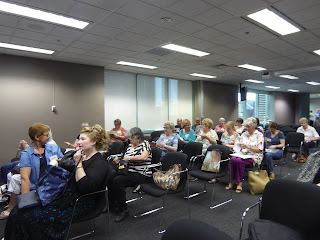An Interview with Helen Smith, speaker at DNADownUnder.
A few weeks ago I asked Helen to answer some DNA questions, for me, here are her answers.
Thank you, Helen.
1) How many years have you be doing
genealogy research and why did you start?
I have been researching for 32 years.
I had always had an interest as my father was English but I started research in
earnest to stop my mother plaintively complaining that she never knew her
grandfather (due to a family split which is a whole another story!). I found out one thing then another and was hooked!
2) When did you first use DNA, in your
research and why?
I did my first DNA test in the days
when blood was required. Then did a mitochondrial test with Ancestry which
while interesting did not help me much. It was not until autosomal testing
started that I found DNA to be a useful genealogical tool for me personally
though I had been trying to entice some Quested males to do a YDNA test for my
One Name Study (offer is still open, gentlemen!)
3) Has using DNA, helped solve any
puzzles, you had or has it given you more puzzles to solve?
DNA has been a useful additional tool
in my research showing matches along my researched paper trail. In more recent
years it has been a very useful tool in helping adoptees and people with
misattributed parentage find out about biological family and that is a very
satisfying thing to do.
4) What are the advantages in using DNA,
in your genealogy journey?
DNA is another tool that should be used
in conjunction with our other research techniques. It can show that our paper
trail is confirmed when we find descendants. It can help when there is a lack
of paper records and also in situations of the second wife situation, blended
families and the times when a father is not given on a certificate.
5) Can you see any pitfalls, to using
DNA?
DNA is a great tool used wisely and
with knowledge about what the different tests can and can’t do for your
research. Unless you have won Lotto (and can afford to test everybody that
agrees) it is important to have a targeted testing plan to help in your
research. The use of DNA tests has encouraged the researching of descendants and
collateral lines which is a good thing.
6) What testing companies have you used
and were your results similar or not?
I have tested with 23andme, Ancestry,
LivingDNA, FTDNA and MyHeritage for autosomal DNA and previously the
Genographic project, Ancestry then FTDNA for mitochondrial DNA. My estimated
ethnicity results are broadly similar between the companies but, being a science
nerd, I know the ethnicity results are a work in progress dependant on the
reference populations and the algorithms at each of the companies. I test to
find relatives not for ethnicity. Where relatives have tested at more than one
company they have been found and that of course is the thing “Which company did
your cousin test at?” It really is a case of fishing in all the ponds to find
family.
7)What is your favourite part of the DNA journey?
Finding links? Graphing out the
connections? Solving puzzles? I am a science nerd so love the science of it,
love the detective work in solving puzzles
8) Where do you see genealogy DNA
heading?
I see the increased integration
of DNA testing into genealogical research where it will become as accepted as
using a certificate or a will in in our research. I love the fact that we are in the time when
people are saying that we can find new ways of sorting information, new
clustering tools and how computer programmers are getting involved as they have
been doing genealogy and are integrating DNA into their research and want to
visualise things better. We are in the exciting times of new tools, greater computing power being available to help in out use of DNA and the results.
9) Have you ever had a person, in one of
your talks, come up and say, ‘I think we are related.’?
One of the joys of being a speaker is that you
often use your own family for examples. I have had three occasions where
someone has come up to me after they heard me speak. I have also had lovely
people who remember my names of interest and send me snippets they have found
for my Quested One Name Study.
10) Anything else you would like to add?
We live in wonderful times to do
family history research with computers then the internet, the increased
availability of digitised records (though of course not everything is digitised
and we still do need to go to archives and to other research repositories and
should walk in our ancestor’s footsteps when we can.) The Internet has also
made available so many learning opportunities for everyone as well as making us
more connected around the world. DNA is another tool that is helping us in our
research. We do live in wonderful times.
I am the convenor of the Genealogical
Society of Queensland’s DNA SIG which has just celebrated its fourth birthday.
My
website and blog: http://www.dragongenealogy.com/ I have written two books “Death Certificates and Archaic Medical Terms”
and “Google, the Genealogist’s Friend” as well as being a contributing author
to the book “Brisbane Diseased: Contagions, Cures and Controversy”.


Comments
Post a Comment